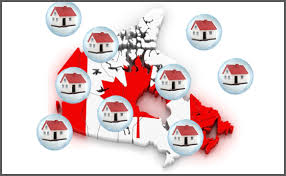How Brexit could affect Canada’s real estate market
Posted by Steve Harmer on Wednesday, August 3rd, 2016 at 1:15pm.
 It may be a way to attract foreign investors away from already hot markets like Vancouver and Toronto
It may be a way to attract foreign investors away from already hot markets like Vancouver and Toronto
Britain’s decision to leave the European Union last week plunged governments worldwide into a pit of economic and political uncertainty. The ripples of the referendum will have an unmistakable impact on global economies and, by association, on global real estate markets. But only temporarily.
Interest rates will remain low
The immediate impact of the post-Brexit vote on Canada’s economy will be pressure to keep interest rates at historically low levels, explained BMO chief economist Douglas Porter and senior economist Robert Kavcic in a report last week. This is, in part, because other segments of our country’s economy would feel the impact of the Brexit fall-out, such as the nearly $16 billion in products we export to the U.K.
 Expect fewer Brits on our shore
Expect fewer Brits on our shore
This uncertainty, and its impact on the British pound and the Euro, could prompt a portion of the 725,000 Brits who traveled to Canada last year to rethink their vacation plans, explains Walter Melanson, founder and lead analyst at PropertyGuys.com. “That doesn’t mean Canadians with vacation rentals should expect a loss in income, as the uncertainty in Europe has certainly helped the U.S. dollar and that could mean more visitations from our neighbours down south.”
Could be a great time to buy Brit-property?
 The uncertainty caused by the Brexit vote could also cool the British property market—a market that has been notoriously popular for foreign investors from around the globe. “Foreign investors may see this as another example of buying a good investment as a cheaper price,” says Melanson. “Much like the speculators who bought when the U.S. housing market took a 50% dive, this same style of buyer may see this as an opportunity to get into the London market.”
The uncertainty caused by the Brexit vote could also cool the British property market—a market that has been notoriously popular for foreign investors from around the globe. “Foreign investors may see this as another example of buying a good investment as a cheaper price,” says Melanson. “Much like the speculators who bought when the U.S. housing market took a 50% dive, this same style of buyer may see this as an opportunity to get into the London market.”
Push investors to other shores
Or the long-arduous process of extricating the U.K. from the European Union could spark a flight of capital to other markets like Canada’s, says Melanson. Investors still want to buy real estate. They still want to park their money in an inflation-protected investment. Despite headlines of overheated markets, Canada still looks like a great deal.
Problem is, says Melanson, many of these investors aren’t actually looking for a revenue-producing purchase—just a place to park their money, away from the prying hands of other governments and other tax agencies.
“A home is not an investment if the investor leaves it empty,” says Melanson. “They’re not looking for cash flow by renting it out or to make a buck on the appreciation value. They’re looking to park their money. It’s a flight to safety.” Even after imposing a 28% tax on foreigners who buy and sell British property, the real estate market in England continued to show strong sales, with prices climbing higher and higher each year.
 These investors just want to get their money out and into a safe off-shore investment and Canadian real estate fits that bill, says Melanson.
These investors just want to get their money out and into a safe off-shore investment and Canadian real estate fits that bill, says Melanson.
Our government needs to be proactive
“We don’t want to scare money out of Canada, but the feds need to figure out where they want foreign investment and then build those incentives.”
While not against restrictions—such as imposing a foreign-buyer tax—Melanson is far more supportive of a system of incentives. In other words, the federal government needs to figure out where they want the foreign money to go and then create a system to get it there. “If this foreign money is spent with an investment thesis that has little to do with rental income or future appreciation then these investors don’t care if they purchase a $1 million property in Vancouver or five properties in St. John’s, Newfoundland worth $1 million. They just want the stability that Canada’s real estate has to offer when parking their money.”
The recent Brexit vote, then, could be used as a way to build an advantage—a way to attract foreign investor money into regions of Canada that would benefit from investor interest and away from already hot markets, like Vancouver and Toronto.
© http://www.moneysense.ca/spend/real-estate/income-properties/how-brexit-could-affect-canadas-real-estate-market/

